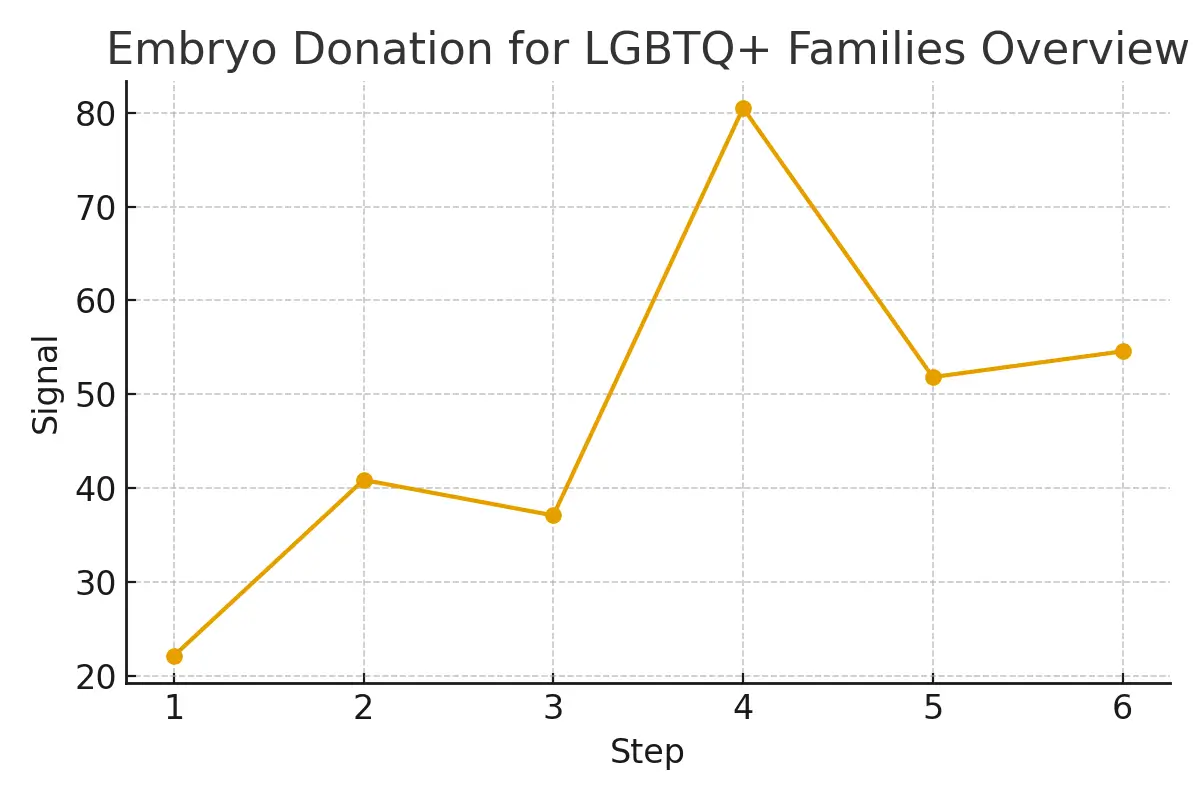
Embryo donation is an important family-building option within the LGBTQ+ pathway. It can shorten timelines, reduce costs, and provide an alternative for families who may not use their own eggs or sperm. This guide explains where embryo donation fits, what it changes, and how smart planning improves outcomes.
What It Is
Embryo donation means receiving embryos created by another family, often from unused IVF cycles. These embryos are donated so others can use them to achieve pregnancy.
For LGBTQ+ parents, embryo donation can provide a faster, more affordable, and compassionate pathway to parenthood.
Who It Helps
Embryo donation may be a strong fit for:
- Families facing high costs of fresh donor eggs or sperm
- Intended parents with limited fertility response or poor embryo quality
- LGBTQ+ couples who prefer avoiding stimulation or retrieval procedures
- Parents open to parenting without a genetic link
It may be less ideal for those who strongly prioritize genetic connection or wish to use specific donor characteristics.
Step-by-Step
- Eligibility Screening – labs, uterine evaluation, infectious disease tests
- Embryo Matching – review donor profiles, medical history, legal details
- Legal Contracts – clarify rights, responsibilities, and consent
- Cycle Preparation – align uterine lining with embryo transfer schedule
- Embryo Transfer – proceed with transfer, followed by pregnancy monitoring
Pros & Cons
Pros:
- Lower cost than creating embryos from fresh donor eggs
- Faster process since embryos already exist
- Helps reduce unused embryo storage for other families
- Compassionate option that often includes legal clarity
Cons:
- No genetic connection to intended parents
- Limited choice of donors compared to egg/sperm donation
- Variable embryo quality depending on source clinic
- Emotional complexity in disclosure and long-term family planning
Costs & Logistics
- Line items: embryo adoption/donation fees, clinic transfer costs, legal contracts, medications
- Authorizations: insurance rarely covers, so escrow and upfront budgeting matter
- Cash flow: simpler than full IVF but still requires tracking meds, monitoring, and legal fees
- Timeline: often 2–4 months from match to transfer
What Improves Outcomes
- Clinic calendar alignment – avoids missed windows for embryo transfer
- Lab quality indicators – higher-grade embryos improve live-birth odds
- Legal documentation – ensures clarity for both donor and recipient families
- Mental health support – helps process emotions around non-genetic parenthood
- Uterine evaluation – critical to ensure readiness for implantation
Case Study
One couple had multiple failed IVF attempts with their own eggs. They chose embryo donation, which allowed them to bypass additional costly stimulations. With careful legal planning, mental health support, and uterine prep, they achieved pregnancy on their first donated embryo transfer.
Lesson: Donation can transform uncertainty into clarity when budgets, health factors, or repeated failures create roadblocks.
Mistakes to Avoid
- Skipping legal contracts before transfer
- Ignoring embryo grading or lab quality
- Underestimating the emotional impact of non-genetic parenthood
- Forgetting to check insurance/escrow details before committing
- Rushing the process without thorough screening
FAQs
Q. What is the difference between embryo donation and adoption?
Ans : Embryo donation usually refers to embryos given anonymously or through a clinic program. Adoption often involves more formal legal processes and ongoing contact agreements.
Q. How much does embryo donation cost?
Ans : It typically ranges from $5,000–$20,000, significantly less than IVF with donor eggs or sperm.
Q. Can we choose the donors?
Ans : In some programs, yes—you may see basic donor characteristics. In others, embryos are matched anonymously.
Q. What are the success rates with donated embryos?
Ans : Success depends on embryo quality and lab standards. On average, pregnancy rates range from 30–50% per transfer.
Q. How long does the process take?
Ans : Once matched, most families move from screening to transfer in 2–4 months, making it one of the fastest pathways to pregnancy.

Dr. Kulsoom Baloch
Dr. Kulsoom Baloch is a dedicated donor coordinator at Egg Donors, leveraging her extensive background in medicine and public health. She holds an MBBS from Ziauddin University, Pakistan, and an MPH from Hofstra University, New York. With three years of clinical experience at prominent hospitals in Karachi, Pakistan, Dr. Baloch has honed her skills in patient care and medical research.





